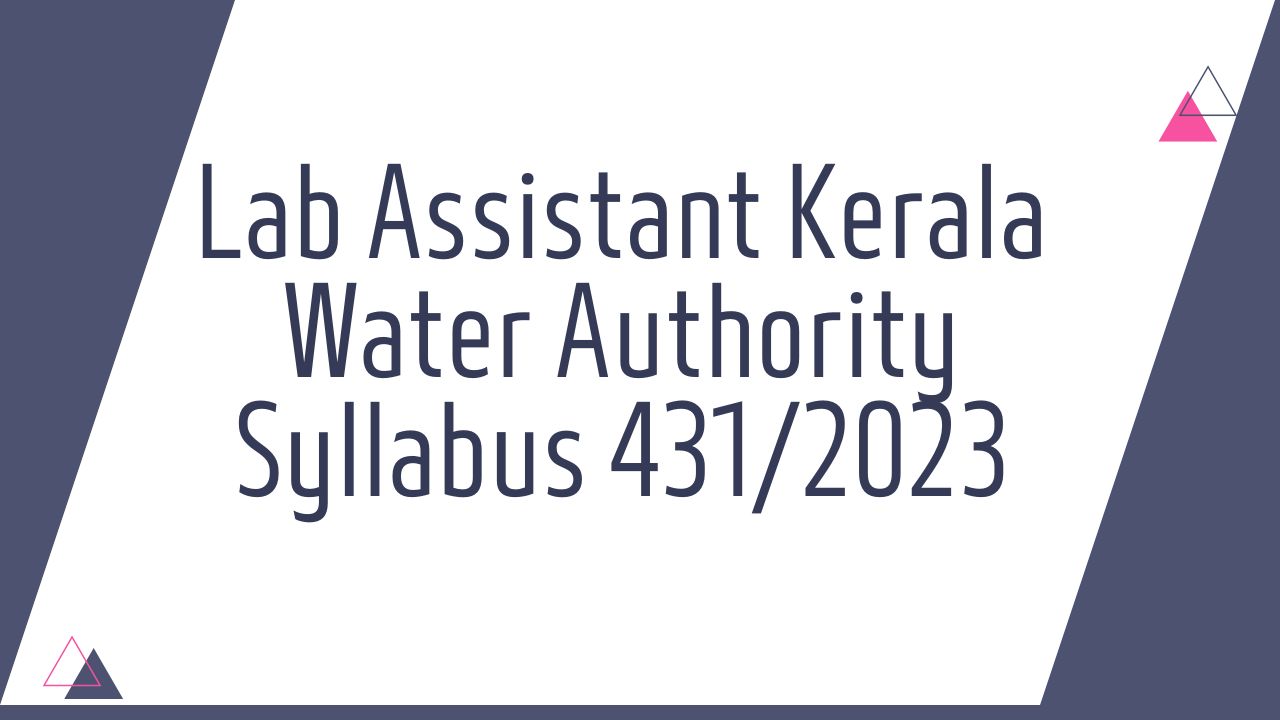lab assistant kerala water authority, kerala water authority lab assistant syllabus :
This guide outlines the key areas you’ll need to master to succeed in the upcoming exam.
The syllabus is divided into six main sections: Medical Laboratory Technology, Physics, Chemistry, Botany, Zoology, and Mathematics.
Medical Laboratory Technology (MLT) forms a major part of the exam, focusing on essential lab practices, blood analysis, and body fluid examination. You’ll also delve into Microbiology and Parasitology to understand bacteria, diagnose diseases like malaria, and analyze tissues with Histotechnology and Cytology.
Moving to the world of science, Physics covers fundamental concepts like motion, forces, and electricity. Chemistry explores basic calculations, the periodic table, and the building blocks of life – biomolecules. Botany focuses on plant structure, reproduction, and the exciting field of Biotechnology.
Understanding the human body is crucial, and Zoology delves into human physiology and genetics. Finally, a solid foundation in Mathematics is required, covering sets, functions, and other essential concepts.
Remember, this is a roadmap, not an exhaustive list. The exam might explore additional topics relevant to the Lab Assistant position. So, use this syllabus as a springboard to delve deeper and become a well-rounded candidate for the Kerala Water Authority!
Lab Assistant Kerala Water Authority Syllabus
PART I: MLT (Medical Laboratory Technician)
- Module I – Basic Laboratory Techniques
- Knowledge of Laboratory chemicals, cleaning of glassware, bio-medical waste management, first aid techniques, sample collection and processing, common laboratory instruments, distillation and deionization, laboratory management system.
- Module II – Blood and Phlebotomy
- Methods of blood collection, blood cell identification, hematological tests, blood banking and immunohematology.
- Module III – Clinical Pathology and Biochemistry
- Analysis of body fluids, biochemical tests like blood glucose estimation, renal and liver function tests, lipid profile, serum electrolytes, cardiac and tumor markers.
- Module IV – Microbiology and Parasitology
- Classification of bacteria, sterilization methods, culture techniques, identification of bacteria, serological techniques, laboratory diagnosis of malaria and filariasis.
- Histotechnology and Cytology
- Tissue processing, staining, diagnostic cytology.
PART II: Physics
- Units and Measurements, Kinematics, Dynamics, Mechanics of Solids and Fluids, Heat and Thermodynamics, Oscillations & Waves, Electrostatics, Electro Dynamics, Magnetism, Electromagnetic Induction & AC, Electromagnetic Waves, Ray and Wave Optics, Modern Physics, Semiconductor Physics.
PART III: Chemistry
- Some Basic Concepts of Chemistry, Structure of Atom, Equilibrium, Electrochemistry, Surface Chemistry, Periodic Classification of Elements, Hydrogen, S-Block and P-Block Elements, Organic Chemistry Principles and Techniques, Biomolecules, Polymers.
PART IV: Botany
- Cell Structure and Function, Reproduction in Organisms, Sexual Reproduction in Flowering Plants, Biology in Human Welfare, Biotechnology Principles and Processes, Ecology.
PART V: Zoology
- Human Physiology covering digestion, respiration, circulation, excretion, locomotion, neural control, reproduction, genetics, biology in human welfare, animal kingdom.
PART VI: Mathematics
- Sets, Relations, Functions, Factorial of numbers, Progressions, Trigonometry, Conic Sections, Vectors, Derivatives, Straight Line.
Note: This is not an exhaustive FULL SYLLABUS list and the exam may cover other topics relevant to the educational qualifications required for the position.

